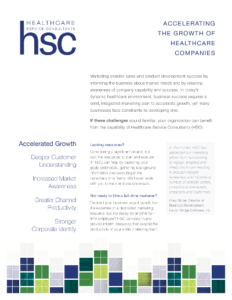Table of Contents
Let’s review some strategies for healthcare IT companies to consider in an effort to succeed during this difficult time. As B2B healthcare IT companies attempt to adjust their strategies to the new normal of the COVID-19 era, uncertainty looms large. From employee health to business continuity, an entire spectrum of concerns is influencing internal and external practices.
While some communities are considering easing into “business as usual,” the impact of COVID-19 will dictate exactly what that means. Healthcare IT companies can take what we’ve learned during this time to optimize future sales and marketing strategies, as well as day-to-day operations.
The benefit healthcare IT companies have is that they are software solutions-focused. So, when a pandemic forces disruption, many are uniquely poised to move quicker than most to optimize short- and long-term outcomes.
1. Virtual Tools Support Product Commercialization
Social gathering restrictions plummeted from 250 people to 100, to 50, to 10, and then no gatherings at all. Sales teams witnessed this disruption with dread. Healthcare IT purchases are driven by cross-functional groups. Annual sales meetings that typically center around internal product launches, sales training, budget development, and team-building–all canceled.
Trade shows suffered the same fate. At least in the traditional sense.
In-person sales meetings and trade shows have a long future before they become “archaic.” But, thanks to the COVID-19 pandemic, virtual solutions have been thrust into the present as tools to keep teams engaged. While much of this can take place via video calls, phone, and email, the added value of meeting face-to-face is on hold.
This trend also shifts the entire way of approaching the sales process. Online platforms can facilitate sales presentations, customer training, virtual product support, and even installations and deployments.
Sales and marketing can also use virtual tools to their advantage. Many digital tools that are already used for in-office communications can be easily applied to remote workers. In many respects, marketing, software development, and service are often the functions most able to leverage their existing technology stack towards remote work.
A core component of what marketing does is to gather information—not just deploy it. Capturing customer feedback, performing competitive analysis, and sourcing product details can all occur relatively simply in a virtual format. Then, contributing their own insights, marketing can go to sales and service teams to inform messaging (both internally and externally).
2. Future Scenarios & Potential Benefits
While many of the virtual capabilities discussed above were already available, most companies relied on them as a fallback position. The COVID-19 pandemic has now given them no other choice but to leverage them to the fullest extent possible. As it turns out, many healthcare IT companies can run as efficiently in a virtual space.
We can never know, definitively, what the future holds. All we know is that the last few months have changed how we do business now. Here are three lessons healthcare IT companies should consider, post-pandemic.
2.1 Larger Talent Pool
Limiting hires (sales, service, marketing, research and development) to “local in-office” presents occasional barriers. Virtual opportunities open up the talent pool to skilled candidates who live anywhere. Recruiting a top performer becomes easier when relocation exits the picture.
The same applies to contracted experts. This is something I have routinely encountered over HSC’s history—being brought on as a fractional CMO. Working in a virtual environment, companies may be more inclined to cast a wider net to find someone who is the right fit for their needs.
2.2 Cost Savings/Less Overhead
Even small to mid-size companies can expect to spend a significant amount on their annual sales meetings and to attend tradeshows. Costs incurred include:
- meeting spaces/conference rooms
- trade show registration
- booth materials
- hotel rooms
- meals
- supplies
Holding these events in a virtual space reduces costs and might enable more frequent gatherings. While not a substitute for in-person relationship-building, they enable discrete pieces of work to get done.
In terms of office space, a brick and mortar presence will not go away completely. But, increasing the number of employees working from home lessens overhead and can lessen costs of physical space.
2.3 Improved Productivity
Office culture can sometimes be rife with distractions. While coworker camaraderie does have benefits, too much contact hinders performance. One study, reported on by Business News Daily, found that office workers spent an average of 66 minutes per day discussing “non-work” topics. This compares to the 29 minutes of remote employee counterparts. Managers, especially, caused a distraction. The study found they spent nearly 70 minutes each day talking about non-work topics.
Office culture is really the responsibility of leadership. But, ensuring productivity speaks to a healthcare IT company’s potential for success as a whole.
3. Key Takeaway: Not Where, But How
The COVID-19 pandemic has forced companies into the virtual space. In many ways, those in healthcare IT are in a better position to adjust to that space than most. Yet, the most important takeaway from a pandemic-induced environment is this:
What really matters is how your company implements its product commercialization practices—not where they do it.
A focused sales and marketing strategy must underlie all tactics that support product commercialization. Whether that is building multiple buyer personas, revamping a website, engaging with thought leaders, or evolving product messaging. Disjointed efforts will only get you so far. No matter what’s going on in the world, healthcare IT companies need a cohesive approach to both internal and external commercialization efforts.
Photo by Felix Mittermeier on Unsplash




